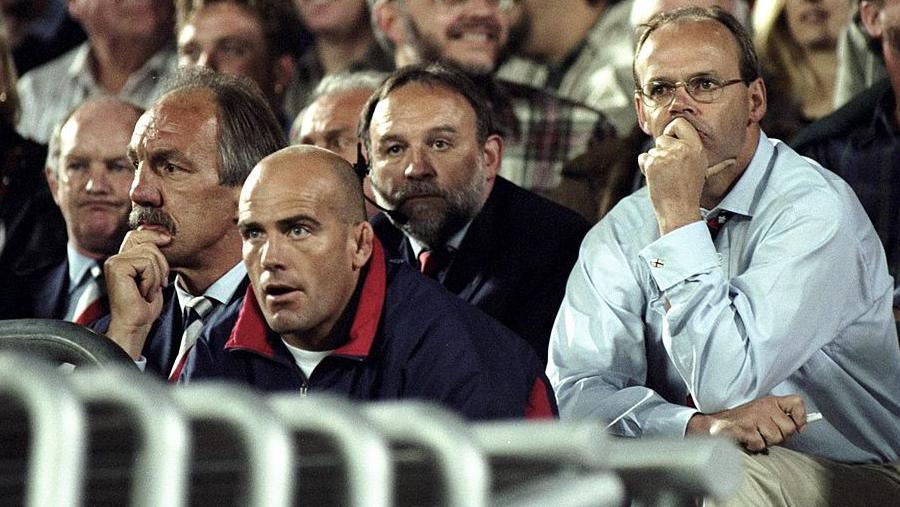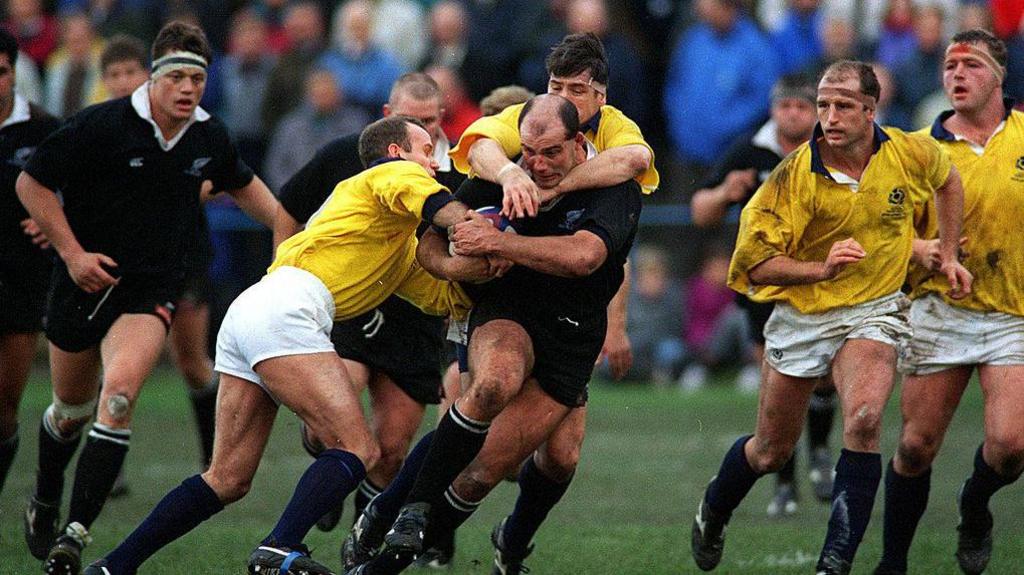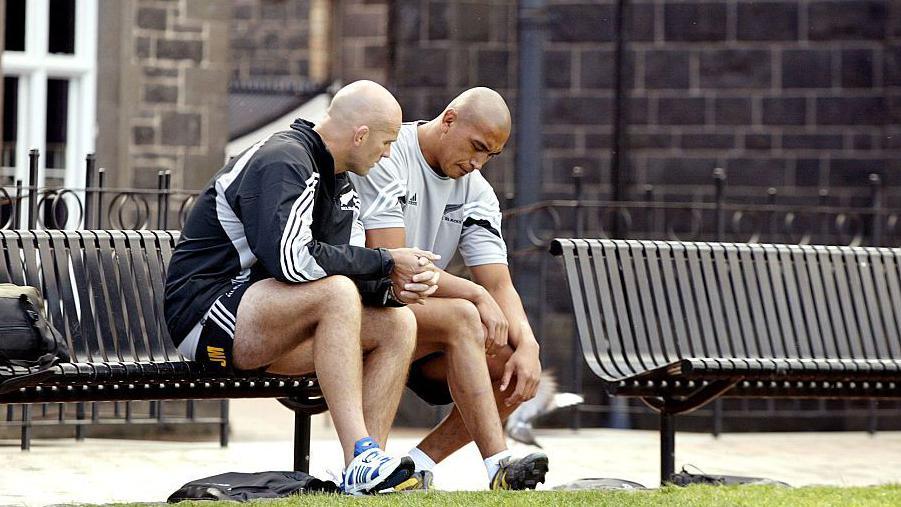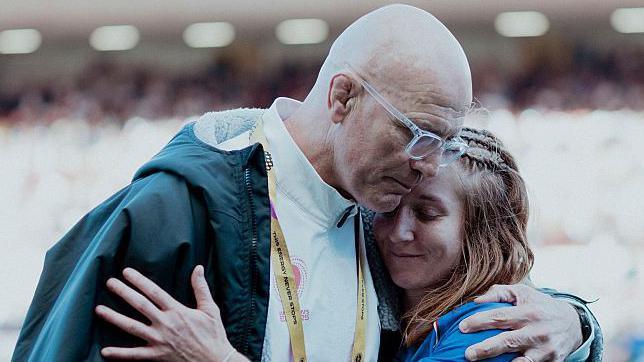From All Blacks to Red Roses - Mitchell's coaching journey

John Mitchell and Sir Clive Woodward watch on as England suffer a heavy 76-0 defeat by Australia
- Published
England women's head coach John Mitchell was coaching top-level rugby before many of his World Cup-winning squad were born.
Since taking over as Ireland forwards coach in 1996, the New Zealander is in his 16th official coaching role.
Mitchell, 61, boasts an impressive CV that includes two stints with the England men's team and a World Cup as head coach of the All Blacks.
He has also held positions across the globe in South Africa, Australia, the United States and Japan, with his longest tenure coming at Super Rugby side Western Force between 2006 and 2010.
And he is now a World Cup winner having steered the Red Roses to victory over Canada at a sold-out Allianz Stadium.
A handy back-rower, Mitchell's playing career was the opposite of his coaching journey. He made more than 100 appearances across 10 years for New Zealand provincial side Waikato but never reached Test level.
During his time at Waikato, Mitchell also played a season in the All-Ireland League for Limerick-based Garryowen.
His return to Ireland in 1996, to work under fellow New Zealander Murray Kidd, who had coached at Garryowen, marked the beginning of his coaching ascent.
An opportunity arose the following season to take charge of Sale Sharks and he moved to England for the first time.
By 1997 Mitchell was in the England camp, specialising in defence under the leadership of Sir Clive Woodward.
"He is a man that expects commitment. If you are committed to the team and him as a coach then he'll give you everything back," former England full-back Matt Perry recalled.
"Being a proud Kiwi coaching England, the drills were challenging and brutal and you had to have the right mindset.
"With defence you don't have to be angry but on your mettle at all times and really want to make tackles. He certainly made us aware of his principles and practices."
'A massive part in England's 2003 World Cup success'
England's infamous 1998 'Tour of Hell' is best remembered for a record 76-0 defeat by Australia.
Perry played at outside centre that day, with Jonny Wilkinson starting at fly-half for the first time.
With several key players injured or unavailable, it was an inexperienced squad that lost four Tests in Australia, New Zealand, and South Africa.
Yet it proved a pivotal turning point, as many from that group went on to become world champions in 2003.
Mitchell left the England set-up in 2000 - a decision he did not agree with, but accepted.
"John Mitchell was a massive part of why England won the World Cup without a doubt," said Perry, who won the last of his international caps in 2006.
"He created a steel within the side that you saw shone through."
England v Canada: Rugby World Cup final guide
- Published27 September
What makes Canada so good and will they cause World Cup upset?
- Published23 September

Mitchell featured for a New Zealand XV against a Scotland Development XV in 1993
A move back to New Zealand to coach Super Rugby side the Chiefs followed, before the All Blacks appointed a then 37-year-old Mitchell as head coach in 2001.
He won back-to-back Tri Nations titles (now known as The Rugby Championship) and chose to take a young squad to the 2003 World Cup, with centre Tana Umaga and scrum-half Justin Marshall the only players with more than 50 caps.
A disappointing semi-final exit to hosts Australia increased the pressure on Mitchell, who was later replaced as head coach.
But, as with his time in England, greats of New Zealand rugby - such as Richie McCaw and Dan Carter - took their learnings from his tenure and went on to win the World Cup.
"I took a risk with a younger squad that eventually served the All Blacks for another nine years," Mitchell recalled.
"I wasn't the bearer of my fruit, but I made all those changes and took the gamble of taking an enthusiastic squad that was playing outstanding rugby."
New Zealand Rugby cited Mitchell's difficult relationships with the media and sponsors as the main reasons for his departure.

Mitchell (left) having a quiet word with the late great New Zealand flanker Jerry Collins
Softer side develops after life-changing knife attack
A coaching role with his former side Waikato kept Mitchell in New Zealand before he moved on to coach clubs in Australia and South Africa.
In 2010, while at his home in Johannesburg, he was stabbed by intruders, then tied up and interrogated.
The experience of fighting for survival helped the New Zealander open up a softer, more emotional side.
"I was a little bit lost in my career when it happened," Mitchell told the Good, the Bad and the Rugby podcast., external
"My leadership was poor and my coaching was poor. I was stuck and I wasn't open at that point. As a result of that, I found a way.
"The message it sent me was that I need to change the way I think and stop chasing outcome and change my process and evolve, and do things in life that are important to me."
After brief stints as head coach of the United States national team and South African side the Bulls from 2016–2018, Eddie Jones hired Mitchell as England's defence coach - marking a full-circle moment in his career.
Mitchell put his family first and remained living in South Africa to ensure his daughter got through high school, while his son Daryl moved back to New Zealand in 2011 where he later became a Test cricketer.
He went on to mastermind a defence that conceded just seven points in an epic World Cup semi-final win over New Zealand in 2019.
"I am now in a position where it is not about me," Mitchell told BBC Sport.
"My leadership is now more about the human, and what that means is that I would rather see these girls fulfil their potential and have smiles on their faces for the work they have put in, and see my staff get rewarded.
"It is the serving and mentoring for others that now gives me the best buzz."

Mitchell comforts scrum-half Pauline Bourdon Sansus after his side knocked France out of the Women's Rugby World Cup last Saturday
'Becoming a truly champion side'
BBC pundits pick their starting XV
The itch to return to top-level international rugby as a head coach never left Mitchell.
In 2023, he was appointed head coach of the Red Roses after Simon Middleton fell short in his second successive World Cup final to New Zealand.
Having worked with the Japan men's team at the 2023 World Cup, Mitchell took the England job with a clear message. He wanted his side to "become a truly champion side".
It was always about winning this year's home World Cup, but he also wanted his team to enjoy the journey.
Mitchell is often seen dancing in his team's TikToks, external and made it clear there would be no social media ban during the World Cup, helping to avoid what he described as a "high-performance jail".
Professionalism and high standards remain non-negotiable, but much of that responsibility is shared with his assistants - Lou Meadows, Louis Deacon and Sarah Hunter - young coaches still at the start of their coaching journeys.
The Red Roses are on a record winning run, have won back-to-back WXV1 titles, successive Six Nations Grand Slams and now the World Cup
England are unbeaten under Mitchell's leadership.
Before the tournament, he said: "I told myself that whatever happens, happens. If it doesn't happen [winning the World Cup] then it won't define me.
"I won't let outcome get to me like I allowed it to get to me as it was everything when I was younger.
"To put all your eggs in one basket, I think there is more to just winning it. Yes, getting it done but you need a phenomenal experience in doing it."